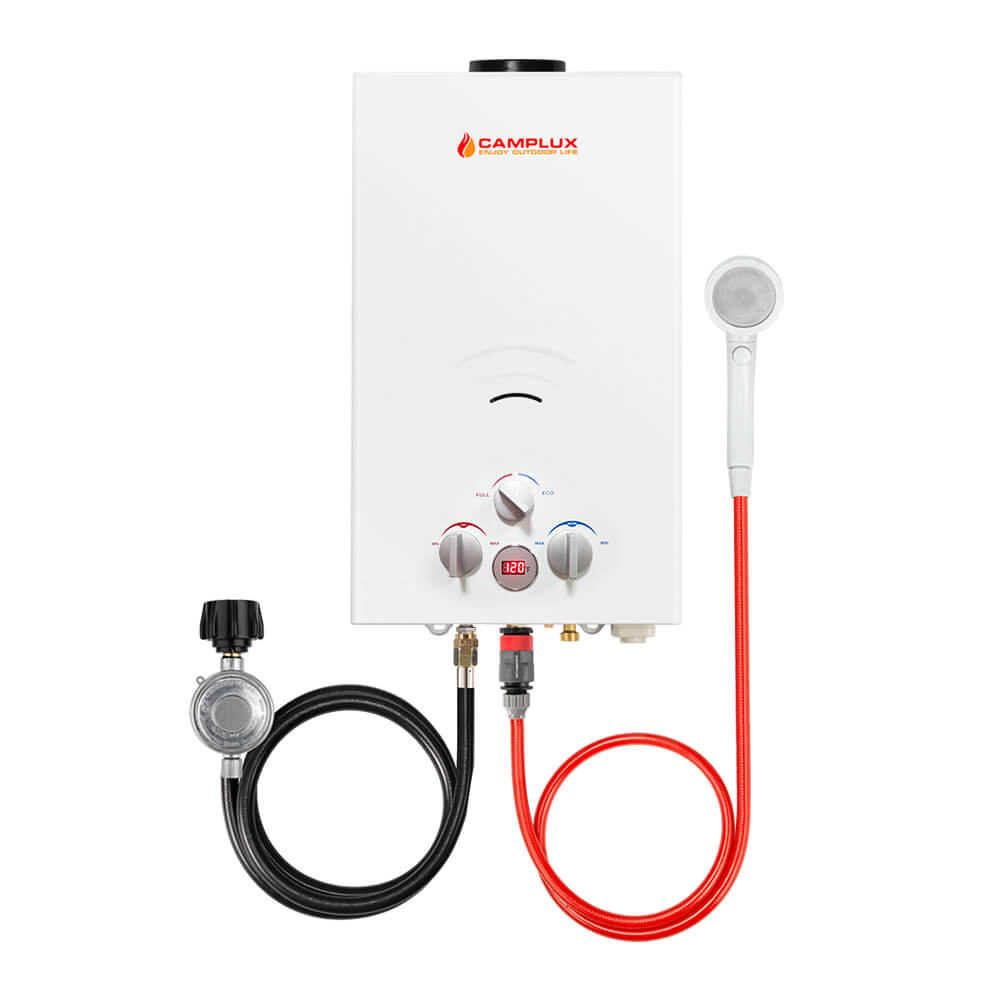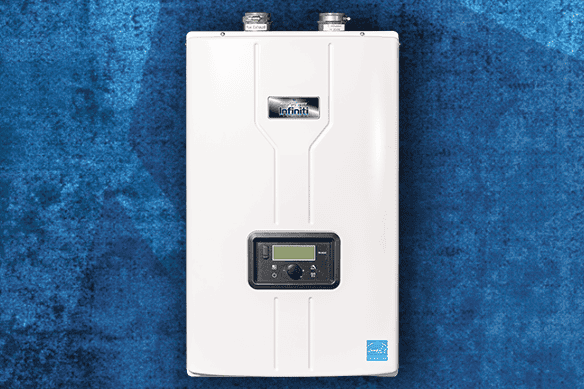My Route To Obtaining The Benefits Of Tankless Water Heaters
My Route To Obtaining The Benefits Of Tankless Water Heaters
Blog Article
Listed here on the next paragraphs you might get a lot of dependable ideas regarding 5 Benefits of Tankless Water Heaters.

In a world where convenience and performance preponderate, it's no surprise that property owners are continuously on the lookout for smarter methods to manage their home's energy intake and convenience. One development that has actually gradually gained popularity is the tankless water heater. Yet exactly what makes these systems stick out from the traditional tank-based models most of us matured with? Allow's dive in and explore the benefits of tankless hot water heater, aiding you make a decision if it's time to make the button in your house.
Intro
Photo this: you step into the shower after a lengthy day, anticipating a comforting waterfall of hot water, only to be greeted by icy beads since the last person used it all up. Noise familiar? Typical water heaters keep a set quantity of warm water, meaning you're at the mercy of that storage tank's supply. Tankless systems, on the other hand, warmth water as needed. Say goodbye to going out mid-shower, say goodbye to fumbling with timetables simply to guarantee warm water is readily available.
Understanding Tankless Water Heaters
What Are Tankless Water Heaters?
Tankless water heaters, often known as on-demand or instantaneous hot water heater, offer hot water only as it's required. Rather than keeping gallons of pre-heated water, these units kick right into activity the moment you turn on the faucet. Water goes through a warmth exchanger, heating up in real-time, meaning you obtain an undisturbed circulation of hot water without the need for a big container sitting lazily by.
How Do They Vary from Conventional Equipments?
Traditional heating systems hold a tank of warm water, utilizing power to keep that storage tank at a regular temperature. Tankless devices eliminate the standing supply, cutting down on lost energy and the bulky impact of a large cylinder. Basically, you're upgrading from a "stockpile" way of thinking to a "made-to-order" technique.
Common Types of Tankless Systems
Tankless hot water heater normally can be found in 2 selections: gas and electrical. Gas designs have a tendency to deliver greater circulation rates, suitable for bigger families, while electrical versions often serve smaller sized homes and are generally less complicated to install. Additionally, some systems are developed for point-of-use (serving one fixture) while others can handle the whole home's hot water needs.
Trick Benefits of Tankless Hot Water Heater
Power Performance and Price Savings
No more warming a titan tank's well worth of water and maintaining it toasty throughout the day. Tankless heating units decrease standby power losses, which can reduce utility expenses. While the initial expense might be greater, the long-term cost savings frequently warrant the investment.
3. Space-Saving Layout
If your home is short on storage, eliminating the cumbersome container frees up useful room. Tankless units are small and can usually be mounted on walls, stashed in edges, or installed in tight utility closets without hogging the entire space.
4. Longer Life expectancy
A well-kept tankless water heater can outlive its tank-based relative. Traditional tanks could last 10-15 years, while tankless designs can keep downing along for twenty years or more, making them a strong financial investment gradually.
1. Limitless Hot Water Supply
Ever needed to schedule showers so everyone gets their reasonable share of hot water? With tankless, that becomes a distant memory. As long as the heating unit's circulation ability isn't surpassed, you can take back-to-back showers without turning into a popsicle.
5. Improved Water High Quality
Storing water in a storage tank can in some cases bring about sediment accumulation or a somewhat "off" preference. With tankless systems, fresh water is heated up instantly, decreasing the possibilities of debris buildup and potentially providing cleaner-tasting water.
Considerations Before Switching
Though the benefits are compelling, it's wise to think about a couple of elements before completely committing.
Examining Your Home's Water Usage Patterns
If your household at the same time utilizes multiple fixtures with high hot water need, see to it the unit's circulation rate fulfills your needs. Recognizing your use patterns assists you pick the ideal size and type of tankless heater.
Maintenance and Treatment Tips
Tankless systems are fairly low maintenance, yet they aren't set-it-and-forget-it devices.
Routine Cleaning and Descaling
Tough water minerals can build up in the warmth exchanger, affecting efficiency. Regular descaling (often advised every year) keeps the system going for peak performance.
Annual Specialist Assessments
A yearly checkup from a professional makes sure small problems are captured early. They'll analyze the system's efficiency, look for leaks, and aid preserve optimal effectiveness.
First Investment Expenses
Tankless heaters commonly include a greater upfront price tag. Between the device itself and potential installment adjustments, the first cost may give you sticker shock. However keep in mind to watch it as a long-lasting financial investment.
Installment Needs
Depending upon your home's infrastructure, you may require extra electrical capability or gas line upgrades. Ensure you comprehend the installation demands and consult with an expert to stay clear of surprises.
Ensuring Appropriate Air Flow
For gas versions, proper ventilation is important to safely get rid of exhaust gases. See to it airing vent systems are tidy and correctly installed to avoid any kind of possible safety and security threats.
Contrasting Different Brands and Models
Not all tankless hot water heater are developed equivalent.
Investigating Trusted Suppliers
Seek reputable brand names with a history of producing top quality systems. A dependable supplier often supplies much better client support and longer warranties.
Installment: DIY or Specialist?
While some property owners cherish dealing with jobs themselves, tankless installation could not be the very best time to break out the tool kit.
Benefits and drawbacks of DIY Setup
A do it yourself mount could save money, however it features threats. Incorrect installation can cause inadequacy or safety and security problems. If you come in handy and have experience, it could be viable-- however wage caution.
Checking Out Evaluations and Individual Comments
User reviews and responses from neighbors or close friends that have gone tankless can supply valuable understandings. Often, real-life experiences can be extra informing than advertising and marketing sales brochures.
When to Call a Professional Plumbing
For a lot of, calling a pro makes sure every little thing's done properly. A professional plumber comprehends neighborhood codes, sizing requirements, and airing vent parameters, decreasing the threat of problems.
Making best use of Efficiency
You have actually bought a tankless device-- currently optimize its performance.
Optimum Temperature Level Settings
The majority of people set their systems between 120-140 F. Changing the temperature can improve convenience and cost savings. Experiment to find a sweet place that does not waste power.
Pairing with Low-Flow Fixtures
Want to extend your system's capabilities? Take into consideration installing low-flow showerheads and taps. They lower water use, permitting your tankless system to deliver a consistent stream of hot water without stressing.
Environmental Impact
Tankless hot water heater align with greener living objectives.
Decreased Carbon Impact
By using much less power and just heating water as required, tankless systems can decrease your home's carbon footprint, lowering your ecological impact.
Saving Natural Resources
Much less power intake and less squandered hot water translate into fewer natural resources being utilized, an ecological win-win.
That Profits Most from Tankless Heating units?
The appeal of tankless heating units is that they can fit a range of houses.
Huge Family Members vs. Solitary Residents
Large families could enjoy the countless warm water supply, while single passengers appreciate the energy savings from not heating up a whole tank for simply someone's early morning shower.
Home Owners with Restricted Space
If your home is short on square footage, shedding the large container liberates area for other basics-- or perhaps just a lot more breathing space.
Eco-Conscious Consumers
Going tankless aligns with eco-friendly worths, ensuring you're not squandering power or sources.
Future Trends in Tankless Water Heaters
The world of home devices is ever-evolving, and tankless water heaters are no exception.
Innovations in Technology
R&D is continuously enhancing warm exchangers, making systems more efficient and durable. Future models might be even quieter, more portable, and better suited for differing environments.
Smart Home Assimilation
Imagine changing your water heater's temperature via an app or receiving upkeep notifies on your phone. As smart home tech developments, we'll see even more connection and convenience.
Verdict
Choosing a tankless hot water heater is greater than just upgrading your home's warm water system; it's buying long-lasting comfort, power effectiveness, and a greener lifestyle. By considering your house's water use, being mindful of installment demands, and committing to normal maintenance, you can enjoy a stable stream of warm water without the baggage of a cumbersome tank. As modern technology evolves, you can expect even smarter, a lot more efficient tankless options that not just make your life easier but also benefit the earth.
Pros and Cons of Tankless Water Heaters
Tankless Water Heater Pros
Saves Energy: Simply put, you re spending less energy to create hot water, so your total carbon footprint goes down, not to mention your bills. Lasts Longer Than Storage Tanks: Storage tank units need to be replaced every 15 years or so. But tankless units? They can last for 30 years before they give out on you. Constant Hot Water: Need to take a shower and don t want the water running cold? Awesome it won t. The water will stay hot the entire time because it creates hot water on demand. Saves You Money: Less water usage equals less money. Beyond that, you re not paying to keep water hot 24/7. Those savings add up quickly. Better for the Environment: Less water waste is better for everyone. It saves you money, but it s also environmentally conscious at the same time. Tankless Water Heater Cons
It Can Take a Minute: Depending on your specific unit and its placement, it can take anywhere from 10 seconds to 2 minutes to fully heat up. Because there s no storage tank, it heats water as you need it. Upfront Purchase Price: While we talked about their longevity, there s sticker shock when you look at brand-new tankless units to install. It pays for itself, but it s still a big chunk of change at first. Has its Limits: If you run multiple appliances at once, such as the dishwasher, washing machine, and maybe you take a shower at the same time, there might not be enough hot water. https://www.airsouthnow.com/blog/water-heater-service/pros-and-cons-of-tankless-water-heaters/

I am just very focused on 5 Benefits of Tankless Water Heaters and I hope you appreciated the new blog posting. If you please take the opportunity to distribute this write-up if you enjoyed it. Thanks so much for taking the time to read it.
Apply Now Report this page